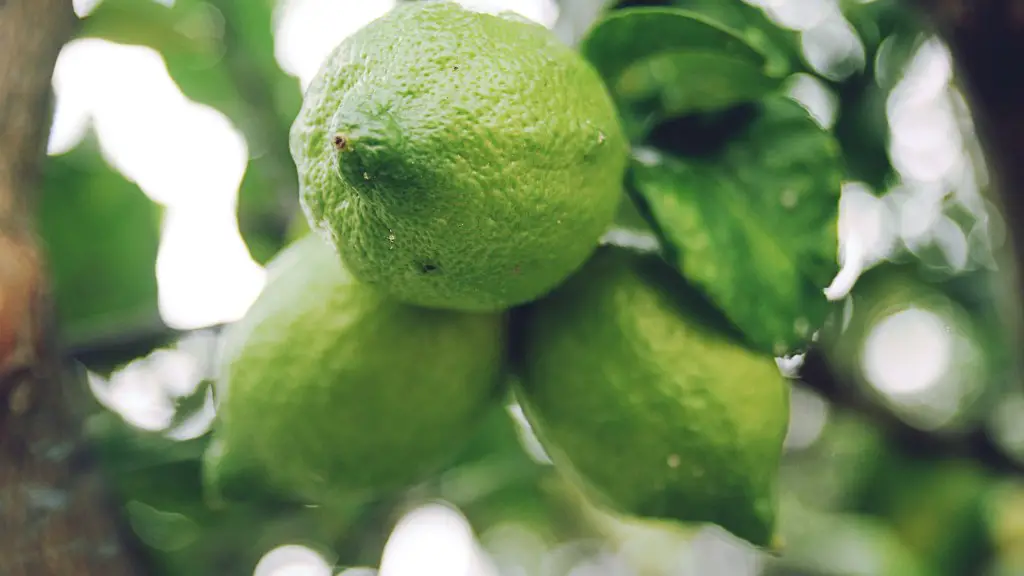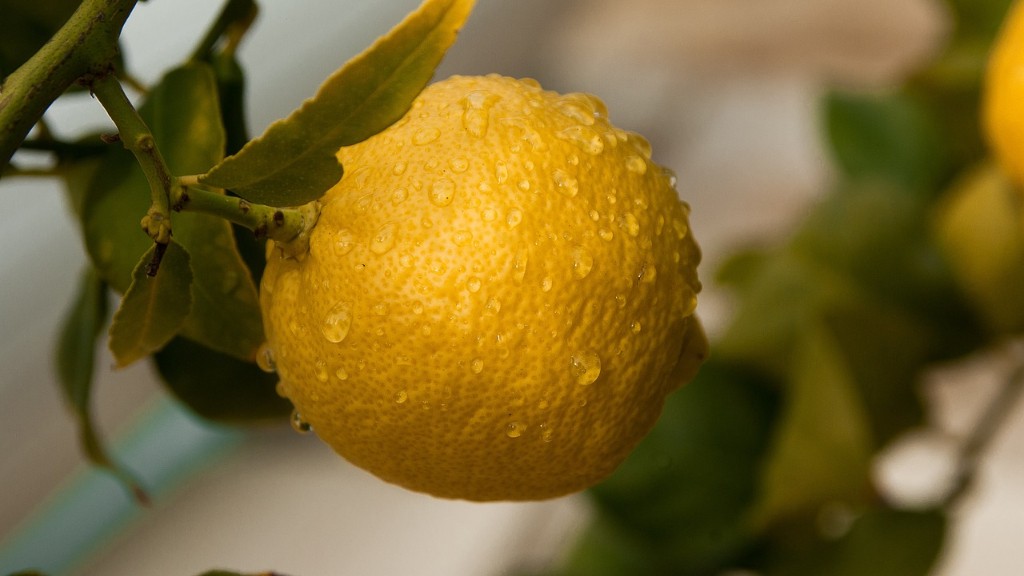Will green lemons ripen off the tree? This is a question often asked by those interested in cultivating citrus fruits. Lemon trees produce lemons that can be harvested when green and, with the proper care and storage, will eventually ripen. It is also possible to ripen green lemons by leaving them on the tree until they turn yellow.
Lemon trees generally produce most of their lemons when they reach maturity, which generally takes three to five years. The smaller lemons produced in the first two years of growth are typically not ripe when they fall. They must be left on the tree to ripen, or they can be picked green and ripened off the tree.
When harvesting green lemons, it’s important to choose only those lemons that are slightly firm and not overly ripe. Conversely, overly ripe lemons should not be harvested, as these will not ripen off the tree. At the proper stage of ripeness, the green lemon will last for several weeks when stored in a cool place or refrigerated.
To speed the ripening process, green lemons can be stored with other fruits, such as bananas or apples, as ripe fruit emits ethylene gas, which encourage other fruits to ripen. Storing green lemons with other fruits will create an environment where the fruit will ripen more quickly. Additionally, placing the green lemons in a paper bag or wrapping them with newspaper will add to the ripening process.
Leaving the green lemons on the tree can also promote ripening. If the tree is healthy and gets enough care, the fruit will generally turn yellow when ripe. However, if the tree is affected by a pest or a disease, the lemons may remain green. The amount of fruit ripening will also depend on the health of the tree and the temperature and humidity levels in the environment.
Both citrus growers and home gardeners can benefit from knowing how to ripen green lemons. They can harvest the fruit earlier and store it until it is ripe. Or, they can wait for the lemons to ripen on the tree, which can take several months or longer. Either way, the key to successfully ripening green lemons is to ensure that the tree is healthy and that the fruit is harvested at the correct stage of ripeness.
Other Considerations for Ripe Lemons
Producing ripe lemons can also depend on the type of tree. Some varieties may have different flavor profiles and textures depending on when the fruit is harvested, whether green or ripe. Each lemon variety has its own unique characteristics, so knowing which trees produce the best, sweetest, juiciest lemons is key to successful growing.
Likewise, the quality of the soil and climate can also affect the taste and ripening of lemons. Warm, sunny climates will tend to produce sweeter, juicier lemons, whereas cooler climates will generally produce lemons that are less sweet and more acidic. To produce the best tasting lemons, it’s important to provide trees with the right environment and soil pH balance.
Fortunately, citrus trees can tolerate a wide range of soil types and climate conditions. Lemons can thrive in soils with a pH range from 6 to 8. In addition, lemon trees need a minimum of six hours of sun each day for optimal growth, however, excessive heat and dryness can scorch the trees, resulting in premature ripening or an overall lack of fruit.
Finally, by providing the trees with the necessary nutrients and care, lemon trees can both produce fruit and bear sweet, succulent lemons for years. Since lemon trees are relatively long-lived and can produce fruit for many years, it’s worth enough to invest the time to properly care for them.
Harvesting Ripe Lemons
To tell if a lemon is ripe, it’s important to observe the color of the skin. The skin should be firm, and the lemon should weigh more than slightly smaller ones. Fully ripe lemons should be bright yellow in color. Additionally, a ripe lemon should feel heavy in your hand and bounce back to the touch.
When harvesting ripe lemons, gently twist and pull the fruit downward until it comes away from the branch. If a mature, ripe lemon is harvested when required, it should easily detach. Never pull up on the fruit, as this could break off the branch, leaving the lemon still attached to the tree.
When harvesting ripe lemons from the tree, the farmer or home gardener can get the most out of their lemons. Ripe lemons will have more juice, be sweeter and have a longer shelf life. Once harvested, it’s a good idea to store them properly and in refrigeration to preserve their best qualities.
Storing Ripe Lemons
Storing ripe lemons properly is essential for ensuring the fruit stays fresh for longer. To prevent premature spoiling, it’s best to store lemons in the refrigerator or a cool place, as high temperatures will make them wilt and spoil quickly.
Ideally, lemons should be placed in an airtight container or heavy-duty plastic bag to preserve freshness. The lemons should also be spaced with enough room for air to circulate, as this helps the fruit remain firm and juicy. Additionally, if storing the lemons for longer than 2-3 days, it’s best to wrap them loosely in paper towels, as these provide extra protection against condensation and spoilage.
Another way to preserve lemons is to cut them into slices or wedges and freeze them in ice cube trays with a little bit of water. Once frozen, they can be stored in freezer bags or containers. Frozen lemons can keep for up to three months, and they can be used in a variety of recipes or frozen drinks.
Preserving the Juice
One of the main benefits of harvesting ripe lemons is the abundance of juice available. The juice can be used in a variety of recipes, or it can be preserved for future use. To preserve the juice, it’s best to strain it and pour it into jars or ice cube trays before freezing or refrigerating it.
When pressing and straining the juice, it’s important to use a fine mesh strainer, as this will ensure that no lemon seeds or pulp are mixed in with the juice. Once stored, the juice can be used in recipes or mixed with drinks for up to a month, depending on the storage conditions.
Making Use of Lemon Peel
For those looking to make use of the entire lemon, the peel can also be used as an ingredient in recipes. To extract the oils from the peel, farmers and home gardeners can use either a traditional juicer or a microplane, which grates the zest into a fine powder.
The zest of a lemon is rich in a unique type of flavonoid known as limonene, which gives lemons their distinct taste and smell. The zest can be used to add flavor to soups, salads, dressings, and even desserts, as it pairs well with both sweet and savory dishes. Additionally, the juice and the zest can be used together to make a citrusy glaze or a lemon dressing.
Furthermore, the peel contains plenty of antioxidants and vitamins, and it can be used as a garnish or as a flavoring ingredient. Additionally, the peel can be used to make lemon essential oil or infused simple syrups. Regardless of the intended use, harvesting ripe lemons and making use of the entire fruit can result in delicious culinary creations.
Conclusion
Green lemons can ripen off the tree if they are picked at the right stage of ripeness and provided with proper care and storage. To ensure that lemons ripen successfully, it’s important to ensure the tree is healthy and has adequate sunlight, water, and nutrients. Ripe lemons should be stored in the refrigerator, preferably in an airtight container, and can be frozen for longer shelf life. The juice and zest of lemons can also be extracted and used in a variety of recipes and drinks. By harvesting and using ripe lemons, farmers and gardeners can enjoy the sweet, sour flavor of fresh, homegrown fruit.




